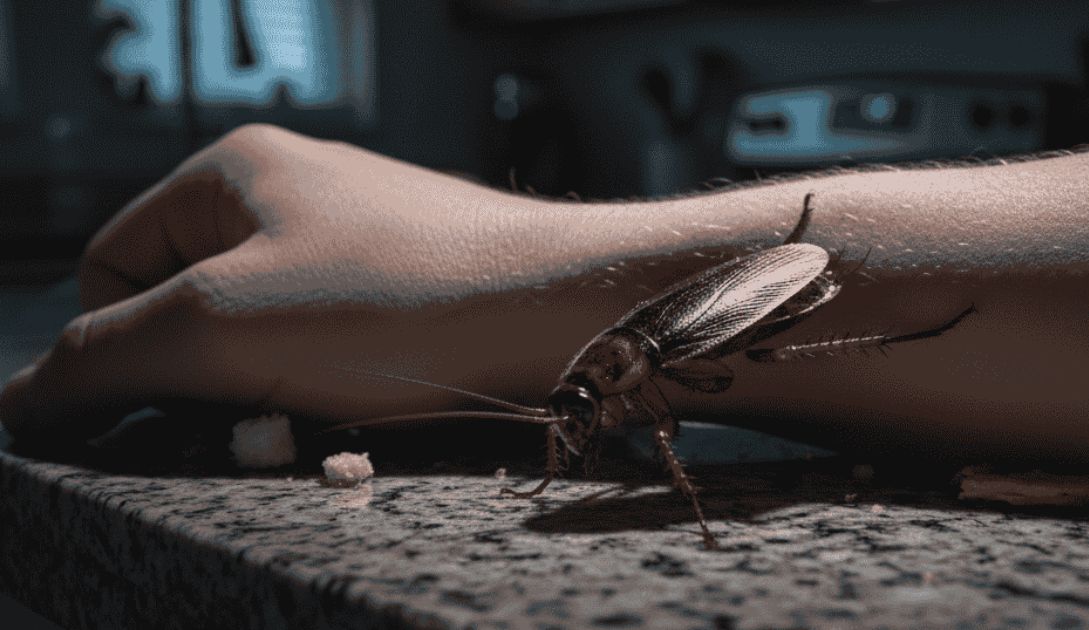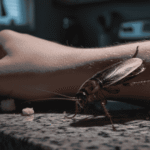Table of Contents
Roaches are among the most dreaded pests in homes worldwide. Often linked with filth and disease, the sight of one scurrying across your kitchen can leave anyone unsettled. But there’s another question that creeps into many people’s minds: Can roaches bite?
While these creatures are notorious for lurking in dark corners, it may come as a shock to many that roaches can, in fact, bite. However, roach bites are rare and typically occur in particular situations. Though roaches generally avoid human interaction, their behavior can change when food is scarce or when they’re overcrowded. In this guide, we’ll look at whether roaches can actually bite, why they do it, how to recognize the bite, and, most importantly, how to prevent it.
Can Roaches Actually Bite Humans?
The idea of a roach biting a human is unsettling, but it’s important to understand that while roaches can bite, it’s very rare. Roaches are not naturally aggressive creatures, and they prefer to stay out of human sight whenever possible. They typically only bite when their food sources are running low or when they feel desperate.
Key Points:
- Roaches usually feed on decaying matter and garbage, not humans.
- Bites are most likely to happen at night when roaches are most active.
- Roaches may bite in unsanitary environments, such as places with overcrowding or poor cleanliness.
Real-Life Example:
A report from a hospital in New York documented a rare case of a woman who was bitten by a roach while she was sleeping. She woke up with a swollen, irritated bite on her arm. Upon investigation, it was determined that the home had a significant roach infestation, and the roaches were looking for food.
While this type of incident is rare, it highlights that under certain conditions, roaches will bite. So, while it’s not something to be overly concerned about, it’s something to be aware of.
Why Do Roaches Bite? Understanding Their Behavior
To understand whether roaches bite, it helps to understand their behavior. Roaches are scavengers by nature, and their primary goal is to find food and water. They feed on decaying organic matter, including food crumbs, paper, and even hair or dead skin.
Why Roaches Might Bite:
- Hunger: When food is scarce, roaches may turn to human food or even skin to survive.
- Overcrowding: In homes with severe infestations, roaches might be more aggressive in seeking out new food sources, increasing the chances of bites.
- Survival Mode: If roaches are unable to find food, they may seek any source of nourishment, including human skin, particularly in neglected or unsanitary environments.
Key Fact:
Roaches are not naturally aggressive toward humans. They would rather hide than confront humans, but their need for food can override their avoidance instinct.
Data Point:
Research has shown that roach bites are rare and tend to occur in homes with heavy infestations and poor sanitation. A study from the American Journal of Tropical Medicine and Hygiene reported that roach bites were more likely in households with an infestation of 100 or more roaches.
Can Roaches Bite Pets?
While roaches might seem more interested in humans, they can also bite pets, especially in food-rich environments. Just like they might scavenge on crumbs from the kitchen floor, roaches may bite pets in search of food.
Potential Risks to Pets:
- Bites on Pets: Roaches may bite animals, especially if pets are left to roam unsupervised in areas with poor hygiene or abundant food sources.
- Health Concerns: If roaches are feeding on a pet, this can lead to infections or worse, spreading bacteria that could harm the pet.
Real-Life Example:
There have been instances where small pets, particularly rodents and birds, have been found with bite marks from roaches. This is more likely to happen in homes with severe infestations or in places where food is left out overnight.
Prevention Tip:
To prevent roaches from biting pets, it’s important to store pet food securely and keep living areas clean. Also, ensure that any food bowls are washed and wiped down regularly.
Symptoms of a Roach Bite: What to Look Out For
If you do find yourself the victim of a roach bite, how can you identify it? Roach bites typically aren’t dangerous, but they can cause some irritation and discomfort. Here’s what to look for:
Signs of a Roach Bite:
- Redness and Swelling: A roach bite can cause localized redness and swelling. It may resemble other insect bites but can become more irritated if scratched.
- Itching: Bites are often itchy, and scratching them can make the swelling worse.
- Pain: Although roach bites aren’t usually painful, some people may experience mild discomfort, especially if the bite is on a sensitive area of the skin.
How Roach Bites Compare to Other Insect Bites:
- Roach Bites vs. Spider Bites: Unlike spider bites, which can cause larger swelling or pain, roach bites tend to be smaller and more localized.
- Roach Bites vs. Flea Bites: Roach bites tend to appear less in clusters compared to flea bites, which usually appear in groups on the ankles or lower legs.
Practical Tip for Treatment:
- Clean the bite area with soap and water.
- Apply an over-the-counter antihistamine cream to reduce itching and swelling.
- If the bite becomes more irritated or shows signs of infection, contact a healthcare professional.
How to Prevent Roaches from Biting You
Prevention is the best way to avoid roach bites. Fortunately, there are simple and effective steps you can take to make your home less inviting to roaches.
Practical Steps to Prevent Roach Bites:
- Seal Food Properly: Always store food in airtight containers to avoid attracting roaches. Keep your kitchen clean and wipe down surfaces after cooking or eating.
- Clean Regularly: Regular cleaning helps remove crumbs, grease, and other organic materials that might attract roaches.
- Seal Entry Points: Roaches can enter your home through tiny cracks and gaps. Check doors, windows, and other openings for potential entry points and seal them with weather stripping or caulk.
- Use Natural Deterrents: Some natural substances like bay leaves or essential oils (peppermint, tea tree, or lavender) can deter roaches. Place these around your home, especially in areas where food is stored.
Key Benefit:
By taking these preventative measures, you reduce the likelihood of roach infestations and minimize any risk of roach bites.










